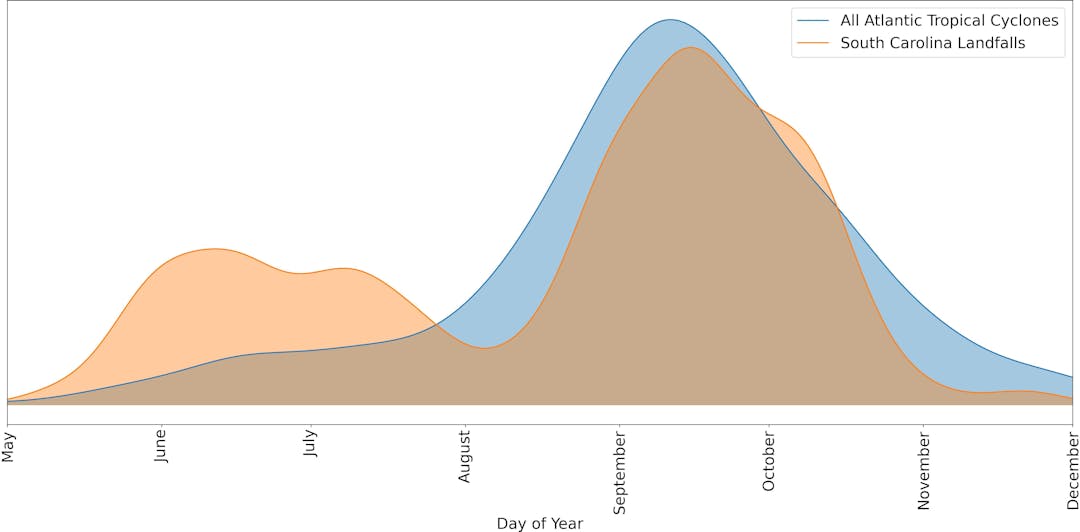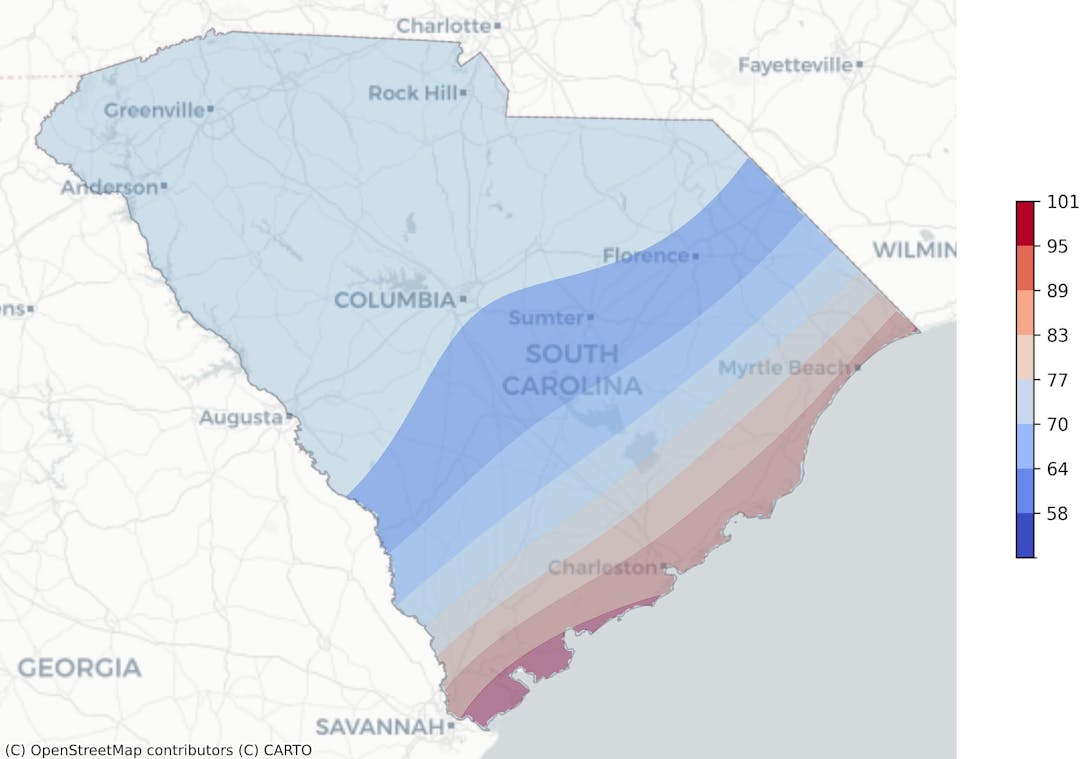Hurricanes in South Carolina
When is Hurricane Season in South Carolina?
The hurricane season in South Carolina officially begins on June 1 and ends on November 30, mirroring the Atlantic hurricane season. This period marks the most probable time for the development of tropical storms, tropical depressions, and major hurricanes.
South Carolina experiences significant impacts from hurricanes, albeit less frequently than some other states along the Atlantic and Gulf coasts
The provided image is a visualization based on hurricane paths going back to 1851. It shows the likelihood of experiencing a tropical cyclone on a particular day of the year. It also compares actual storm landfalls in South Carolina with the storm pattern in the entire Atlantic basin. The data is sourced from the NOAA Hurricane Research division.

Where Do Hurricanes Hit Most in South Carolina?
The coastal areas of South Carolina, including Myrtle Beach, Charleston, and Hilton Head Island, are particularly vulnerable to hurricanes]. Due to their proximity to the Atlantic Ocean, these regions often bear the brunt of hurricane-force winds, storm surges, and flood events.

The provided heat map reveals the frequency of hurricanes and the associated risks in different regions of South Carolina. A gradient color scheme from blue to red signifies the increasing intensity of hurricanes. Regions marked in red, like Charleston and Myrtle Beach, are more prone to high-intensity hurricanes with strong hurricane-force winds. Conversely, the areas in blue, mainly inland regions, experience hurricanes less frequently and with lower wind speeds.
The coastal regions, indicated in red, are most susceptible to storm surges and flood events due to their low-lying terrain and proximity to the ocean.
In summary, while hurricanes threaten South Carolina, the risk is significantly higher in the coastal regions. This data can guide emergency planning and risk mitigation strategies for the state.
What Are the Recent Hurricanes in South Carolina?
- Hurricane Ian (2022): This hurricane caused significant flooding in the city of Georgetown, affecting many streets and businesses. A large number of customers in South Carolina, around 378,000, were affected. In Horry County, the U.S. Coast Guard rescued crews from a stranded commercial shrimp boat.
- Hurricane Isaias (2020): Isaias caused considerable damage in Horry County. Parts of a pier were destroyed, and homes in low-lying areas near the beach were flooded. In Myrtle Beach alone, 483 properties sustained damage, and over 100 baby sea turtles were found dead in North Myrtle Beach. The hurricane also resulted in a fatality when a 76-year-old man drowned in rip currents along the coast while trying to save a swimmer in distress.
- Hurricane Matthew (2016): Matthew caused four direct fatalities in South Carolina. The combination of strong wind gusts and freshwater floods resulted in trees and powerlines being downed more than 50 n mi inland from the coast, forcing the closure of many roads. In Marion County, more than 100 people spent the night on the third floor of the town hall due to rising floodwaters.
- Hurricane Gaston (2004): This hurricane caused heavy rainfall in Berkeley and western Williamsburg counties through Florence and Darlington counties, leading to urban flooding of up to 5 ft. One F1 tornado was reported in Marlboro County.
How to Prepare for a Hurricane Season in South Carolina
Preparation for a hurricane season is crucial, particularly in areas like South Carolina, prone to such natural disasters. Adequate preparation reduces the risk of property damage and, more importantly, the loss of life. Understanding the potential severity and impact of hurricanes can prompt individuals and communities to take necessary precautions, such as creating an emergency plan, stocking up on supplies, and securing their homes.
Before a Hurricane
Preparation is key to ensuring safety before a hurricane in South Carolina. The following list provides steps to take for optimal preparedness:
- Develop a family disaster plan: Discuss where to go and what to do in case of a hurricane warning. Include all family members in this discussion.
- Prepare an emergency kit: Include essential items such as water, non-perishable food, medications, flashlights, batteries, and a first-aid kit.
- Secure your home: Reinforce doors, windows, and roofs. Trim trees and secure outdoor furniture to prevent them from becoming flying debris.
- Stay informed: Monitor weather reports and heed advice from local authorities. This is crucial for safety.
- Document property: Take photographs or videos of your property for insurance purposes.
- Know your evacuation route: Identify and understand the fastest and safest route to a designated shelter or higher ground.
During a Hurricane
Here is a concise list of actions to help in staying safe during a hurricane in South Carolina:
- Stay informed: Keep track of the hurricane's path and intensity by regularly checking updates from reliable weather forecasting websites or apps. This will help you to prepare and react appropriately.
- Prepare your home: Secure your property to withstand hurricane conditions. This includes reinforcing doors and windows, cleaning gutters, and securing loose items that could become projectiles in high winds.
- Plan for evacuation: Identify your local evacuation routes and shelters. In the event of a mandatory evacuation order, leave as early as possible to avoid traffic.
- Stay indoors: If you are not required to evacuate, stay inside and away from windows and glass doors to avoid injury from flying debris.
- Be aware of flood risks: Hurricanes often bring heavy rains that can lead to flooding. Avoid walking or driving through flood waters.
After a Hurricane
Following the aftermath of a hurricane, it's crucial to know what to do after a hurricane to ensure safety and quick recovery. Here's a short list of steps to consider:
- Inspect your surroundings: Carefully examine your home and its surrounding area for any potential dangers like downed power lines, contaminated water, gas leaks, or structural damage.
- Document the damage: Take photos or videos of the damage to your property. This documentation can be useful for insurance claims or disaster assistance applications.
- Contact your insurance company: Report the damage to your home and any losses to your insurance company as soon as possible.
- Register with FEMA: The Federal Emergency Management Agency (FEMA) offers disaster assistance to those affected by hurricanes. Registering with FEMA can help you receive necessary aid.
- Repair and clean up: Begin the process of cleaning up and repairing your home. Always wear protective clothing during clean-up to prevent injuries.
- Check on neighbors: If it's safe, check on your neighbors, especially those who are elderly, have young children, or have special needs. They might need assistance.
- Follow local news and instructions: Stay updated on the situation in your area and follow instructions from local authorities. They will provide guidance on when it's safe to return home if you've evacuated, or when services like power and water will be restored.